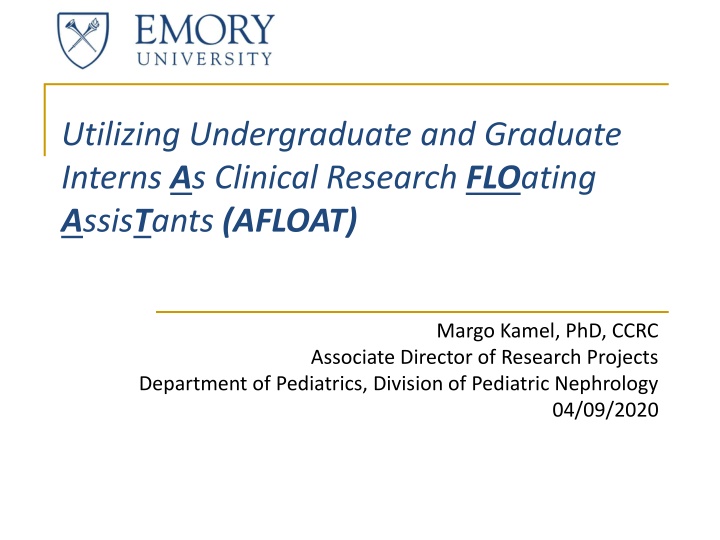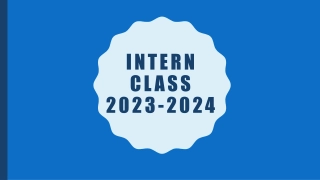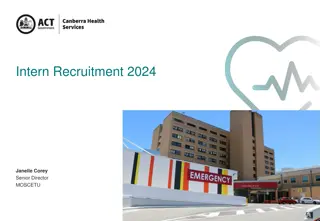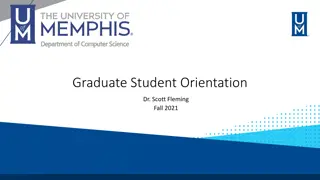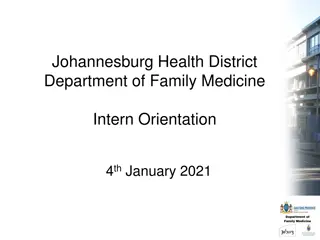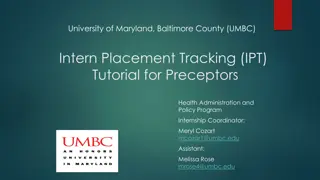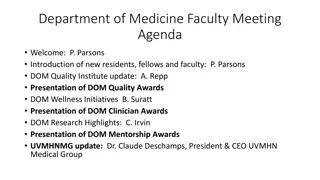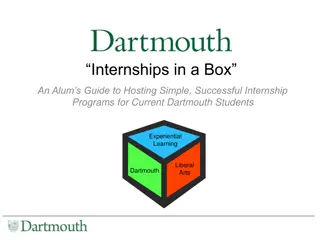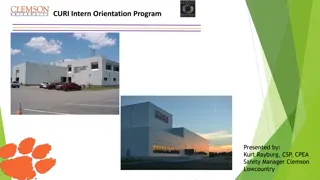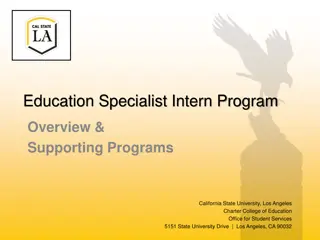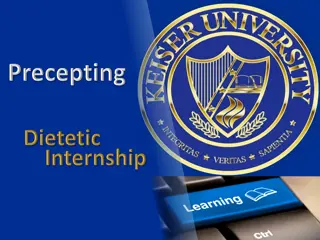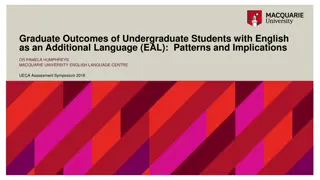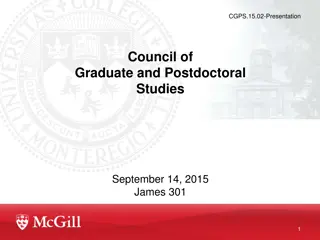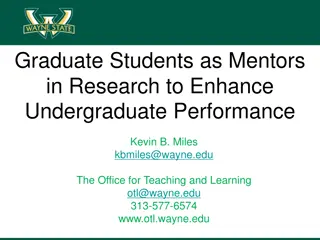Utilizing Undergraduate and Graduate Interns for Clinical Research: AFLOAT Program
Engaging in clinical research can be daunting for new investigators. AFLOAT offers a solution by creating a pool of research assistants for short-term projects and formalizing the training process for interns.
Download Presentation

Please find below an Image/Link to download the presentation.
The content on the website is provided AS IS for your information and personal use only. It may not be sold, licensed, or shared on other websites without obtaining consent from the author.If you encounter any issues during the download, it is possible that the publisher has removed the file from their server.
You are allowed to download the files provided on this website for personal or commercial use, subject to the condition that they are used lawfully. All files are the property of their respective owners.
The content on the website is provided AS IS for your information and personal use only. It may not be sold, licensed, or shared on other websites without obtaining consent from the author.
E N D
Presentation Transcript
Utilizing Undergraduate and Graduate Interns As Clinical Research FLOating AssisTants (AFLOAT) Margo Kamel, PhD, CCRC Associate Director of Research Projects Department of Pediatrics, Division of Pediatric Nephrology 04/09/2020
Clinical Research: It Takes a Village https://jcto.weill.cornell.edu/news/clinicaltrialsday-2017
Engaging successfully in clinical research can be very daunting; especially for new investigators who may not have the experience to hire the right staff for the job Many junior faculty and small divisions do not have the financial resources to hire a full time experienced research coordinator
How can AFLOAT help?? 1. Created a pool of research assistants, available for hire for short term projects (to minimize cost) to faculty of the Department of Pediatrics (DOP) 2. Formalized the training process of undergraduate and graduate interns to engage in clinical research (to minimize administrative burden)
Currently Available Resources Federal Work Study Students Emory Undergraduate AFLOAT Research Program Fairly easy to hire Heavy emphasis on laboratory research Heavy emphasis on clinical research, including data entry and analysis No pre-defined skill set limited engagement period (ex. 1 semester) Extended engagement period (at least one year commitment from student) No formal training process Impetus on student to identify PI to work with AFLOAT liaison guides the matching between students and PIs Focus on a single project (or small part of it) in a mentor/mentee capacity Focus can be on single or multiple projects
AFLOAT: advantages from student presepctive Standardized process: 1. Select and train students in clinical research 2. Determine faculty eligibility 3. Matching student to faculty
Step 1: Student Selection Based on many years of personal experience selecting and training interns in division of pediatric nephrology in the department of pediatrics, I developed and consolidated all the following necessary steps: Eligibility Criteria Undergraduates: sophomores and/ or Juniors; Graduates: MPH students in first year of program Ability to work at least 12 hrs/week in blocks of no less than 3 hrs/day Interview Guidelines Must be face to face interview Hiring Process Initial hiring within champion division or department Credentialing CHOA Facilitate background checks, health screenings, etc CPR training, EMR training, blood borne pathogen shipping training Research Specific Training What is clinical research and how to do it CITI training Regulatory training
Step 2: Faculty Eligibility AFLOAT liaison (MK): Receive request from interested PI Assess project scope Review financial ability/inability to support coordinating staff Reviewed by PI and research administration (RAS representatives, unit business manager, etc) Determine willingness to work and mentor student interns Discuss expectations outlined in PI responsibilities guide
Step 3: Student to Faculty Matching Faculty indicate interest by communicating with AFLOAT liaison Face to face meeting between AFLOAT liaison, intern, and PI Liaison work with PI s home division or department to determine available funding and applicable speedtypes
Completed: Launched AFLOAT on pedsresearch.org website Undergrad guest lectures with Undergraduate Research Programs Ongoing: Present to Department of Pediatrics (DOP) administration Upcoming: Attend departmental and various division meetings to advertise AFLOAT
Success Metrics Intern utilization: Track change in utilization (# of interns used; total intern work-hours, and # of investigators using interns) comparing at baseline vs. annually. Intern skillsets: Track/compare baseline skillsets. Interns will complete a brief questionnaire about current skillsets (e.g., completed IRB submission; developed consent form) every 6 months and comparing at start of program vs. annually. Investigator satisfaction: Survey investigators at end of program assessing satisfaction (broader intern use and less training burden). Investigator productivity: Compare abstracts submitted and papers accepted for publication during 1 year prior and 1 year after the program initiation.
Benefits 1. Enhance clinical research within the Department of Pediatrics (DOP) 2. Enable research conduct on schedule despite limited funding/increases in workload, 3. Enable research funding to match need through a flexible workforce
Questions Margret Kamel, PhD, CCRC Associate Director of Research Projects Division of Pediatric Nephrology mkamel@emory.edu Phone: 404-712-9923 Thank you for your time.
Appendix: Student Skill Set Survey Indicate your competency level of the following research knowledge areas, where 1 = Not competent, 2= Somewhat competent, 3= Competent; 4 = Very Competent Not competent Somewhat competent Competent Very Competent Conducting research activities Collaborating with other departments Communication with IRB Informed consent process Knowledge of research phases Participant safety Maintaining study records
Appendix: PI Post Project Survey Please complete the following evaluation of AFLOAT intern: 1 = Needs Improvement, 2 = Satisfactory, 3 = Good, 4 = Outstanding Needs Improvement Satisfactory Good Outstanding Demonstrates good attendance/promptness. Completes tasks in a timely manner or ahead of schedule. Completes tasks with accuracy and thoroughness. Displays independent creativity and initiative in research. Displays effective oral communication skills. Displays effective written communication skills. Interacts with others and demonstrates good teamwork. Overall contribution level of intern to assigned project: Unsatisfactory Basic Successful High Exceptional Indicate likelihood of future utilization of AFLOAT: Never Rarely Sometimes Often Always
